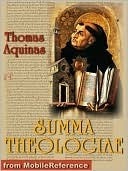More on this book
Community
Kindle Notes & Highlights
God is His own intellectual act.
"All things are naked and open to His eyes"
the eye sees a man through the image of a man.
the division of the soul and the spirit,
if light knew itself, it would know all colors.
to discourse thus is to proceed from the known to the unknown.
effects unknown;
Therefore if the knowledge of God is the cause of things created, it seems that creatures are eternal.
Therefore the knowledge of God is not the cause of things.
Hence the form of the intellect must be the principle of action; as heat is the principle of heating.
inclination is through the will.
knowledge requires likeness between the knower and the thing known.
evil can neither be defined nor known except by good.
the divine intellect is more immaterial than the human intellect.
"reason has to do with universals, sense with singular things." Therefore God does not know singular things.
Although as regards the species in the divine intellect its being has no material conditions like the images received in the imagination and sense, yet its power extends to both immaterial and material things.
"whatever is comprehended by knowledge, is bounded by the comprehension of the knower."
the diversity in the parts of a sentence causes a diversity of enunciations;
speculative knowledge is more excellent than practical knowledge,
an idea is considered to be the principle of knowledge and action. But the divine essence is a sufficient principle of knowing and effecting all things. It is not therefore necessary to suppose ideas.
ideas are understood the forms of things, existing apart from the things themselves.
Plato, who held that ideas existed of themselves, and not in the intellect.
knowledge is of things that are true,
Augustine (Soliloq. ii, 5) condemns this definition of truth, "That is true which is seen"; since it would follow that stones hidden in the bosom of the earth would not be true stones, as they are not seen. He also condemns the following, "That is true which is as it appears to the knower, who is willing and able to know," for hence it would follow that nothing would be true, unless someone could know it.


